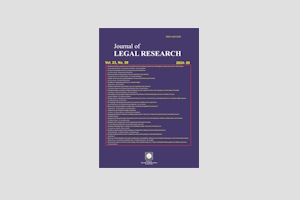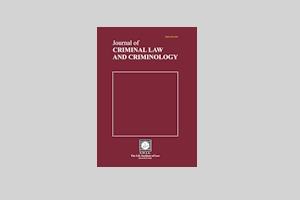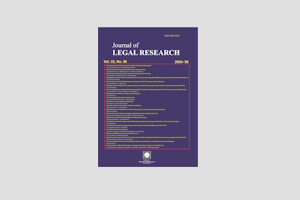Journal of
LEGAL RESEARCH
Number 45
Vol. XIX ● No. 1
Spring 2021
Managing Editor: Vahid Eshtiagh
Editor-in-Chief: Seyyed Ghasem Zamani
CONTENTS
The Challenge of Definition of Crime in Iranian New Penal Code 1392
Dr. Fereydoon Jafari
The Prevention of Repeating Offenses with Protection of Criminals Human Dignity from the Perspective of Criminological Doctrines
Dr. Ebrahim Ghodsi & Behrouz Gholizadeh & Atefeh Sheikh Eslami
The Comparative Study and Comparison of Nature and Effects of Unauthorized Transaction in Stock Exchange and Transaction outside Market
Mohammad Hesam Tavoosi & Dr. Rasool Parvin
Conception and Pillars of Decent Work
Dr. Zohreh Rahmani
A Comparative Study of the Concept of Freedom and its Implications in the Charter of Citizens’ Rights and the Universal Declaration of Human Rights
Ali Eslami & Zahra Jahangir & Dr. Mohammad Kazem Kaveh Pishghadam
The Analysis on Compatibility of Efsad-E-Fel-Arz [Corrupt on Earth] and Moharebeh against Nuclear Terrorism
Dr. Seyed Mustafa Meshkat
Reviewing Environmental Factors Affecting the Drug Industrial (Case Study: Zanjan)
Reza Ahadi & Dr. Shahram Mohammadi & Dr. Hasan Toghranegar
Preventing Financial Crimes and Illegal Wealth of Governmental Officials
Raziyeh Sabzehali & Somaye Sarrami & Dr. Mahmood Ashrafy
The Tax for Right to Quality Arising from Implementation of Public – Constitutional Projects and Partition of Lands
Fatemeh Hasanzadeh & Dr. Gholamreza Kamyar & Omid Mohammadi
Challenges of “Virtual Reality” Tools in the Field of Computer Games (A Comparative Study in Iran and the US Legal Systems)
Mahdi Naser & Dr. Hossein Sadeghi
Instances of Deviation from Trial’s Rules in the Claim to Sale Heritage with a View to Judicial Procedure
Ehsan Bahramy
Opinions of International Human Rights NGOs about Capital Punishment in Drug Related Crimes in Internal Law of the States
Dr. Sattar Azizi & Dr Keivan Eghbali
The Role & Position of FATF in International Law System
Dr. Habibollah Habibi & Dr. Shahram Zarneshan
La Constitutionnalisation De La Procédure Pénale En France Et Aux États-Unis
Author: Dr. Jean Cédras
Translator: Alireza Noorian
Articles
The Challenge of Definition of Crime in Iranian New Penal Code 1392
Original Research
Fereydoon Jafari
Assistant Professor of Law Department, Bu. Ali Sina University, Hamedan, Iran
ABSTRACT:
In criminal law specially and in other law disciplines generally the definition has high importance. Because it shows either the scope or realm of related discipline and avoid scattering them and also ensure the respect to the individual rights on the society. From 300 years ago with initiation of modern criminal law, the necessity of “nullum crimen nulla poena sine lege” as a fundamental rights of human beings entered in constitutional laws and charters, even taught many years before traditionally in Islamic or Christians orders this has been seen. In civil law countries like Iran, fulfillment of these rights in criminal law primarily necessitates “the definition of crime” in penal code. As the Iranian new penal code enacted recently and is effective from June 2013, in this paper the author analyses the “definition of crime” cited in article 2 and its innovations and challenges.
Keywords: Crime, Definition, Islamic Penal Code, Punishment, Security and training measures, Challenges.
The Prevention of Repeating Offenses with Protection of Criminals Human Dignity from the Perspective of Criminological Doctrines
Original Research
Dr. Ebrahim Ghodsi
Associate Professor, Faculty of Law and Political Sciences, University of Mazandaran, Mazandaran, Iran.
Behrouz Gholizadeh
Ph.D. Student in Criminal Law and Criminology, Faculty of Law and Political Sciences, University of Mazandaran, Mazandaran, Iran.
Atefeh Sheikh Eslami
Ph.D. Student in Criminal Law and Criminology, Faculty of Law and Political Sciences, University of Mazandaran, Mazandaran, Iran.
ABSTRACT:
Since a high percentage of criminals commit crimes again after penalty, Dealing correctly with criminals and preventing crime, providing an important influence on the security of society. It is natural that in the event of non-performance and failure to deal properly with criminals punished properly, not only aims to provide criminals cannot be reformed, but their offense is repeated fields would be offered. From the perspective of human rights law and international regulations to reform the individual and society, human dignity should be the number one concern, and not only him as a Mean to intimidate and deter others, do not use (general prevention) But in order to punish the guilty and prevent a repetition of his crime, his abilities and capabilities are taken into consideration and try to make optimal use of them in order to correct him or her. Therefore, the inhibition of the offender, not only through his detention or removal. Also, we should attend to the negative effects penalties in deterring the offender from repeating the crime because this behavior increases the alienation and hatred in criminal person and will trouble his rehabilitation and resocialization. It should be noted that crime, though severe, is blameworthy, not only explain the conflicting reactions with human dignity but also happen to areas of commiting second and further crimes by the offender. The article point out that the criminal acts are not the authority for encounters, violent, disrespectful and wrong reactions against criminals and study the human dignity in the international and internal criminal law and examine the relationship between observance of human dignity and prevention of repeat offenses.
Keywords: Prevention, Repetition of Crime, Human Dignity, Human Rights, International Conventions, Domestic Criminal Law.
The Comparative Study and Comparison of Nature and Effects of Unauthorized Transaction in Stock Exchange and Transaction outside Market
Original Research
Mohammad Hesam Tavoosi
M.A. in Private Law, Department of Law, College of Law, Kermanshah Branch, Islamic Azad University, Kermanshah, Iran.
Dr. Rasool Parvin
Assistant Professor, Department Law, College of Law, Kermanshah Branch, Islamic Azad University, Kermanshah, Iran.
ABSTRACT:
If the broker trades in the client’s account without any purchase or sale order, the transaction will be a prying transaction, which is one of the problems in the capital market. Therefore, if the owner approves the brokerage transaction of the broker, there will be no problem and financial responsibility Also does not notice the broker. But with the non-acceptance by the owner, the broker is considered a usurper and according to the special system that exists in the purchase and sale of securities in the stock exchange. In practice, there is no possibility of canceling the usurious transaction and therefore in case of rejection Curiosity or its enforcement by the owner in any case does not change the original situation, and it is the owner that if he does not enforce the transaction, he must be compensated and the rubbish returned to him.
Keywords: prying transactions, broker, instances of liability creation, securities, voyeur liability, owner permission and rejection.
Conception and Pillars of Decent Work
Original Research
Dr. Zohreh Rahmani
Assistant Professor of Department of Law, Islamic Azad University, Bandar Anzali Branch, Gilan, Iran
ABSTRACT:
Decent work is key element to achieving fair conditions of work and poverty reduction. It sums up the aspiration of people in their working lives. Experience shows that economic growth on its own is not sufficient. We must do more to empower individuals through decent work, support people through social protection. The primary goal of the ILO today is to promote opportunities for women and men to obtain decent and productive work in conditions of freedom, equality, security and human dignity. Decent work and its four pillars-employment creation, social production, right at work and social dialogue become integral element for achieving sustainable development.
Keywords: Fundamental Rights at Work, Decent Work, Social Justice.
A Comparative Study of the Concept of Freedom and its Implications in the Charter of Citizens’ Rights and the Universal Declaration of Human Rights
Original Research
Ali Eslami
Bachelor’s Student, Islamic Azad University, Shiraz, Iran.
Zahra Jahangir
Ph.D. Student in Political Science the Public Policy, Political Science Department, Faculty of Humanities, Islamic Azad University, Shahreza Branch, Isfahan, Iran.
Dr. Mohammad Kazem Kaveh Pishghadam
Assistant professor, Department of Political Science, Faculty of Law and Human Sciences, Islamic Azad University, Shiraz, Iran.
ABSTRACT:
In today’s modern world, the term freedom is very controversial while simple, so that no single definition of it can be presented. Different Islamic and non-Islamic schools have different perceptions about it, each school restricting it based on its own attitude. Some schools regard freedom as absolute, and others consider it to be conditional. The purpose of this study is to investigate the concept of freedom comparative and its implications in the Charter of Citizenship Rights of the Islamic Republic of Iran and the Universal Declaration of Human Rights, to answer these questions; is the concept of freedom and its implications applied equally in both documents? Is freedom recognized in one form in both documents? What are the limiting factors of freedom in documents? Answering these questions in the form of these hypotheses proves that the concept and implication of freedom is different in both documents, although in both documents freedom is considered as the absolute right of mankind. In the Charter of Civil Rights, a legitimate and binding freedom is accepted, while in the Universal Declaration of Human Rights, it is recognized only as binding. The limiting factors of freedom in the Declaration of Human Rights are specified by the law and respect to the rights of others, while in Citizen Rights Charter, in addition to these two, factors such as the need to observe and preserve Islamic principles, the need for religious observance, good morals are specified.
Keywords: Freedom, Charter of Citizens’ Rights, Universal Declaration of Human Rights.
The Analysis on Compatibility of Efsad-E-Fel-Arz [Corrupt on Earth] and Moharebeh against Nuclear Terrorism
Original Research
Dr. Seyed Mustafa Meshkat
Ph.D. in Criminal Law and Criminology, Islamic Azad University, Qeshm Branch, Hormozgan, Iran.
ABSTRACT:
Accessing or attempting to access nuclear material in order to carry out terrorist acts is the most important nightmare of the international community in the current century. The activists of the international law system aimed at counteracting nuclear terrorism in the form of the convention for the suppression of acts of nuclear terrorism in 2005. Thus, the recommendation to criminalize a certain set of actions and to draw up appropriate sanctions against them is a criminal strategy adopted in the face of nuclear terrorism. In this way, Iran, by not joining the convention, has not yet carried out an independent criminalization of nuclear terrorism; nevertheless, the national legislator, following an innovative action by using jurisprudential doctrines, clarifies the crime of Efsad-E-Fel-Arz [corrupt on earth] in article 286 of the Islamic Penal Code 2013. Accordingly, it is found that the definition of the crime as a result crime, the ambiguity in the psychological pillar and not consisting of certain instances of nuclear terrorism is among the most important challenges facing nuclear terrorism. Thus, during this study, the intention was to take the pathology of compatibility of Efsad-E-Fel-Arz [corrupt on earth] and Moharebeh against nuclear terrorism and then the numbers of solutions were proposed.
Keywords: Nuclear Terrorism, Dispersal of Nuclear Material, Nuclear Sabotage, Terrorist Organization, Moharebeh and Efsad-E-Fel-Arz [Corrupt on Earth].
Reviewing Environmental Factors Affecting the Drug Industrial (Case Study: Zanjan)
Original Research
Reza Ahadi
M.A. in Law, Criminal Justice and Criminology, Law Department, Faculty of Humanities and Social Sciences, University of Kurdistan, Sanandaj, Iran.
Dr. Shahram Mohammadi
Assistant Professor, Department of Law, University of Kurdistan, Kurdistan, Iran.
Dr. Hasan Toghranegar
Assistant Professor, Department of Law, University of Zanjan, Zanjan, Iran.
ABSTRACT:
This study investigates the reasons of industrial drug addiction in Zanjan. To investigate the problem, Durkheim and Merton’s theories, Shaw and Mackey’s social disorganization have been used. The methodology is causal-comparative and the population includes the addicts in camps. The sample includes 180 subjects of those available in these camps selected through simple sampling. The tool for data collection is a self-designed questionnaire, and content validity and Cronbach’s alpha were used for validity and reliability respectively, where the total alpha value of independent variables was 0.77. Based on the findings of this study, the main items for changing the pattern of consumption from traditional to industrial drugs are the traditional ones having less euphoria and more consumption difficulty as well as the industrial drugs being cheap. In terms of location, Bisim, Islamabad and Daneshsara have respectively the most individuals consuming industrial drugs. The results obtained in this study are consistent with the results of some of the results of the studies conducted and confirmed the theories used in this article. The results show that there is a significant relationship among anomie, place of residence and emigration, unemployment, easy access and addiction to the industrial drugs.
Keywords: Anomie, Unemployment, Easy Access, Place of Residenceand Emigration, Industrial Drugs.nemployment, easy access and addiction to the industrial drugs.
Preventing Financial Crimes and Illegal Wealth of Governmental Officials
Original Research
Raziyeh Sabzehali
M.A. Instructor of Islamic Azad University, Faculty of Economy and Law, Khomeini Shahr Branch, Isfahan, Iran.
Somaye Sarrami
Ph.D. Student in Political Science the Public Policy, Political Science Department, Faculty of Humanities, Islamic Azad University, Shahreza Branch, Isfahan, Iran.
Dr. Mahmood Ashrafy
Assistant Professor, Faculty Member, Department of Criminal Law and Criminology, Faculty of Humanities and Law, Islamic Azad University of Isfahan, Khorasgan Branch, Isfahan, Iran.
ABSTRACT:
One of the biggest challenges of the present era is the Financia crimes of the governors and governmental officials. It is not a new issue but dates back to the beginning of the government. According to article 47 of constitution, legal ownership is respectful. Illegal ownership is not respected and lawmakers should avoid earning illegal wealth and monitor their wealth in order to prevent financial crimes. When of wealth and properties are clear, Corruption will be prevented and people will trust the governors more. Accordingly to enhance public trust to the governmental officials and governors and increase administrative health executive by law for the rules investigating the governor’s wealth and properties in Islamic Republic of Iran was passed on 23.03.1398. The research method used is experimental-descriptive method and library method was used.
Keywords: Financial Crimes, Preventing, Property, Illegal.
The Tax for Right to Quality Arising from Implementation of Public – Constitutional Projects and Partition of Lands
Original Research
Fatemeh Hasanzadeh
M.A. in International Law, Mofid Qom University, Qom, Iran.
Dr. Gholamreza Kamyar
Teacher of Law Departemnt, Alzahra University, Tehran, Iran.
Omid Mohammadi
Ph.D. Student in Private Law, Faculty of law, University of Judicial Sciences and Administrative Services, Tehran, Iran.
ABSTRACT:
The right to quality is the right to take part of value added resulting from implementation of governmental and municipal public development projects or arising from division or partition of people’s lands. The construction and development of roads and providing public facilities and implementation of urban planning may cause overestimate value for people’s estates or lands that is believed to be unfair.
This point of view resulted in enacting amendment to article 101 of municipality law and license to obtain estate value added arising from partition and division in 1390. The legal system governing the right to quality has changed over the past hundred years. The authors of the laws did not have the same idea before and after the victory of the revolution.
The law of abolishing the right to quality authorized in 1360 was extinct; however, efforts were not made to restore it. The judicial process has not taken a similar form in this regard. There are variant judge’s opinions related to the views of the Guardian Council’s jurisprudents about the right to quality. In this article, laws, jurisprudence and doctrine related to the right to qualify will be analyzed.
Keywords: Right to Quality, Right to Vicinity, Estate Value Added, Public Roads and Passages, Implementation of Public and Construction Project.
Challenges of “Virtual Reality” Tools in the Field of Computer Games (A Comparative Study in Iran and the US Legal Systems)
Original Research
Dr. Hossein Sadeghi
Assistant Professor of Private Law, Business Department, Faculty of Entrepreneurship, University of Tehran, Tehran, Iran. *. Corresponding Author
Mahdi Naser
Ph.D. Student in Private Law, Faculty of Law, University of Judicial Sciences and Administrative Services, Tehran, Iran.
ABSTRACT:
With the development of technology, active companies are able to produce new tools that can simulate human movements in cyberspace. The use of these tools, known as “virtual reality” has many challenges in various legal areas, including intellectual property rights. Challenges to the requirement or non-requirement of the manufacturer of these tools to present their manufacturing technology to the service company and derivative issues raised, issues of over copyright, trademark rights, and copyrights, challenges associated with the compensation mechanism in violations of intellectual property rights of related software tools, related to the theft of personal information or user biometric properties, and the impact on users’ psychological and psychological state of these tools are among the issues raised in this area. Solving existing challenges requires legal policies to regulate the use of these tools, solve legal challenges, and review the mechanisms for protecting personal information and biometrics of users of these tools.
Keywords: Virtual Reality, Challenges and Solutions, Policies, American Law, Iranian Law.
Instances of Deviation from Trial’s Rules in the Claim to Sale Heritage with a View to Judicial Procedure
Original Research
Ehsan Bahramy
Ph.D. Student in Private Law, Faculty of Law, Shahid Beheshti University, Tehran, Iran. *. Corresponding Author
ABSTRACT:
When a person dies and leaves Registrated heritage, final owners of heritage may intend to sale heritage because of practical problems of parcenary in ownership. Evidently, if sale of foregoing heritage is not peacefully Feasable, claim to sale heritage will appear. Trial of claim to sale heritage is sometimes in contrast with the rules of trial and adherent to exceptional provisions. Hence, the claim to sale, which is propounded in the courts, will be Heared only after propounding the claim to partite in documents and estates registration office and Emissioning the certification of non-partition. The request of claim must be passing sentence in an exceptional mode and subsequently, the court determines to sale in an exceptional format. Determining to sale in an exceptional format has effects. First, determination to sale is not subject to the functus officio and judgment of the judge rules. Second, although it is not possible to protest to determination to sale through ordinary and extraordinary ways established in civil procedure code, interested individuals can lawsuit for revocation of the determination to sale. Third, determination to sale is always contradictory. In this paper, we intend to specify foregoing instances in a theoretical mode and search them in judicial procedure.
Keywords: Claim, Sale, Heritage, Rule, Exception.
Opinions of International Human Rights NGOs about Capital Punishment in Drug Related Crimes in Internal Law of the States
Original Research
Dr. Sattar Azizi
Associate Professor, Department of Law of Faculty of Literature and Humanities-Bu Ali Sina University, Hamedan, Iran.
Dr Keivan Eghbali
Resercher in The Judiciary Institute, Ph.D. in International Law, Faculty of Law and Political Sciences, Allameh Tabatabaii University, Tehran, Iran.
ABSTRACT:
Critics about capital punishment for drug related crimes have been among biggest critics of nongovernmental international human rights organizations against our country. However, the laws of about thirty countries containing capital punishment for drug related crimes and therefor a comparison study of these laws and statistics about drug related executions with law and related executions in Iran, can be used as a good mean for analyzing of level of neutrality in opinions of international human rights NGOS in relation to Iran. According to this and by examining the approach of these human rights institutions, it can be concluded that mentioned institutions, have critical opinions in relation to execution of drug criminals and so their critical opinions about Islamic Republic of Iran cannot be considered as exceptional and discriminatory. However, it seems that the volume of criticism against Iran, because of considerable numbers of drug related executions and negative propaganda against Iran, is far more than other countrie
Keywords: Capital Punishment, Drug Related Crimes, International NGOS, Human Rights.
The Role & Position of FATF in International Law System
Original Research
Dr. Habibollah Habibi
Ph.D. in International Law, Faculty of Law, Islamic Azad University, Hamedan Branch, Hamedan, Iran. *. Corresponding Author
Dr. Shahram Zarneshan
Assistant Professor, Law Department, Bu-Ali Sina University, Hamedan, Iran.
ABSTRACT:
The range of responses to the phenomenon of money laundering, terrorism financing and the proliferation has a global dimension and given the diverse reactions of the international community through regional and global organizations, the legal policies of the FATF sooner than previously thought were reflected in domestic and international law and international community. In the meantime, the international community has come to the conclusion that the international fight against money laundering, terrorist financing and proliferation of weapons of mass destruction is only possible through systematic means. FATF is the center of expression of the will of governments and the international community to eradicate these phenomena. The role and position of the FATF in this regard as an international organization has always been controversial in the field of international law. The authors seek to prove this assumption that the FATF is an international organization with a global scope and that its role, position and the recommendations complying with international and customary law.
Keywords: Terrorist Financing, Money Laundering, International Monitoring and Evaluation, Recommendations, Standards.
La Constitutionnalisation De La Procédure Pénale En France Et Aux États-Unis
Translated Paper
Author: Dr. Jean Cédras
Professor at the Faculty of Law, Advocate General in the Court of Cassation, Secretary General of the International Criminal Court.
Translator: Alireza Noorian
Ph.D. Student in Criminal Law and Criminology, Faculty of Law, Edalat University, Tehran, Iran, Judge of Justice. Email: noorian@rocketmail.com
ABSTRACT:
Étranges noces en vérité que celles de la Constitution et de la procédure pénale! Au départ, rien ne semblait devoir les rapprocher. En première analyse en effet, la constitution d’un pays, c’est essentiellement l’organisation des pouvoirs publics, le texte fondamental dont tous les autres dérivent dans l’ordonnancement juridique interne, Le processus de constitutionnalisation des garanties de l’accusé dans la procédure pénale, né aux Etats-Unis, s’étend à de nombreux pays, notamment à la France. Deux traits sont marquants: la légitimité sujette à caution des organes finaux du contrôle (Cour suprême fédérale et Conseil constitutionnel), nommés par le pouvoir politique et le caractère largement prétorien du contrôle (décisions Marbury v. Madison 1803; Liberté d’association, 1971). Avec beaucoup de retard sur le modèle américain, la France s’est engagée à son tour dans un processus qui bride la souveraineté du législateur (élargissement de la saisine du Conseil et réserves d’interprétation prétoriens et récemment, loi constitutionnelle sur la question prioritaire de constitutionnalité).
Keywords: Constitutionalisation, Constitution, procédure pénale, justice du base.





